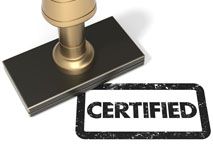Is certified dental software better?

For those of you who aren't aware, there is a federal incentive program that awards up to $63,750 per dentist for use of certified electronic health record (EHR) software. In fact, having integral knowledge of this through assisting dental practice clients who are eligible for the program, I have spoken at conferences on the subject and have written numerous pieces about it. The issue some dental practices have with the program though is that it is run by individual state Medicaid and, in order to be eligible, either the individual dentist or practice must average at least 30% Medicaid-eligible encounters for a 90-day period. With that in mind, dentists who are not eligible ask me all the time, “Why should I care about certified dental software if I'm not eligible for the Medicaid based incentive dollars?”
Well, I can tell you with certainty, having personally assisted dental software vendors in preparation for the federal EHR certification process, that I believe that features and functionality required by the federal testing bodies for certification actually make certified dental software better in many areas. Therefore, even if a dental practice is not eligible for the incentive money, it just might be beneficial to look at certified dental EHRs as part of the evaluation process.
It is important to note that when I mention certified dental software, I am talking about dental software vendors that have invested in modifying their own software to meet certification’s stringent standards and not those vendors that choose to partner with and or offer a third-party medical EHR. In fact, for those interested, I wrote an article for DentalSoftwareAdvisor.com as well as participated in a video interview with Advanstar Group Editorial Director Kevin Henry on this “smoke and mirrors” approach to EHR certification. It helps clarify some of the confusion surrounding this.
So what potentially makes a certified dental EHR better than others that haven't taken the steps to become certified?
There are numerous feature requirements addressing clinical patient care from a user standpoint, such as electronic prescribing, automated drug-to-drug and drug-to-allergy checking, patient problem lists, problem-based patient education, and incorporation of clinical decision support. These are innovative and necessary features for a next generation EHR, but there are a few vendors that have incorporated these features and others without going through the certification process.
Where the requirements for certification really stand out in terms of preparing a dental EHR for your present and future needs are in the following areas:
Problem or diagnosis based treatments and outcomes
With the projected incorporation of diagnosis coding sets into dental software, those vendors that go through certification will be ahead of the game. In medicine, there has been a movement from insurance companies and accountable care organizations based on outcomes and dentistry is projected to be part of this. The testing bodies require that, in order to pass certification on certain modules, a vendor needs to incorporate a diagnostic database and preparation for its use.
Interoperability
There is no doubt that there is a growth of oral-systemic health and awareness of how a patient's problems, conditions, treatments, and procedures affect overall care. Therefore, it will be beneficial to share patient records between not only dental providers, but also dental providers and medical providers. There is a national standard that has been developed and, as part of certification, a dental software vendor must show that it can import and export a patient record in that standardized format.
HIPAA-compliant communications
Over the past couple of years, the federal government has approved development of a nationwide trusted network for sending and receiving patient information. For years, individual states and communities had been developing health information networks, but there was never a standard for communicating until now. As part of a vendor’s EHR certification, the vendor must demonstrate that it can send and receive HIPAA-compliant messages using this trusted network from within its software.
Clinical summaries
There is a requirement to show the certification-testing organization that the dental EHR can structure such elements as problems, diagnoses, medications, allergies, pending tests, procedures, care plans, etc., into a standard structured clinical summary format.
Patient safety
From a usability and patient safety standpoint, requirements are outlined for the vendor to design certain screens and input fields to minimize mistakes and errors that could affect the overall care of the patient.
Security and auditing
Tests for authentication, data encryption, and data integrity are given during the certification process. Included is verification that the vendor software properly creates and manages audit logs and reports reflecting each time a user added, changed, or deleted something within the system.
There are more areas that we could discuss, but the point of this article is to illustrate a few of the critical forward-thinking features that are not necessarily on the radar for most dental software vendors unless they have gone through the federal certification process. Although there continues to be innovative features incorporated into dental software in general, I hope you can see that a dental software vendor that invests the time, resources, and money into the daunting task of getting the official ONC EHR certification might just be a good choice in the long run, regardless of whether you plan on applying for EHR incentive money or not.